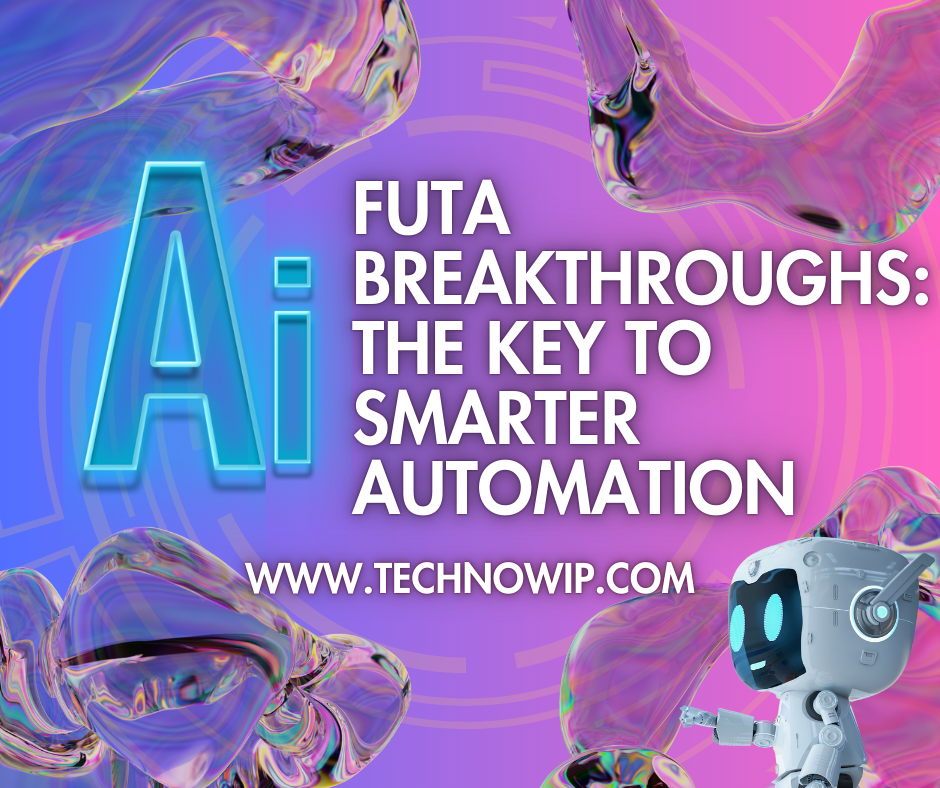Introduction
Businesses today are constantly seeking ways to streamline operations and automate processes more efficiently, with AI Futa emerging as one of the key solutions to meet this goal. AI Futa breakthroughs have quickly changed the face of automation across various industries by unlocking smarter workflows more efficiently than before. In this article, we’ll take an in-depth look at AI Futa technology’s effects in shaping its future; explore case studies; and outline practical methods AI Futa technology can be adopted into businesses’ strategy to stay competitive.
Problem: Traditional Automation Isn’t Enough
- Rigid Automation For these traditional systems to meet business requirements effectively and evolve along with changing business needs effectively requires frequent manual interventions; otherwise known as rigid automation. Consequently they rely heavily on predefined rules and workflows which don’t easily adapt. As a result they require manual interventions more frequently as their functionality needs alter over time.
- Most traditional automation systems struggle with scaling as businesses expand. As more data and processes come into play, these systems become less capable of handling the more complicated operations without slowing down or breaking down completely.
- Traditional Automation Fails to Respond Real-Time Traditional automation has difficulty keeping pace with real-time data changes, often leading to missed opportunities or delayed decision-making which creates inefficiency and lose revenue for companies who rely solely on these systems for insight.
Agitate: Why Current Systems Are Holding You Back
- Outdated Technology Can Harm Productivity Reliance on outdated automation methods is detrimental to productivity. Businesses using old systems risk falling behind competitors who adopt innovative AI-powered solutions such as AI Futa that offer far greater productivity gains.
- Businesses without smart automation risk missing out on important opportunities for innovation. Real-time data, predictive analytics and machine learning offer competitive advantages which outdated systems simply cannot match.
- Case Study: Logistics Industry Struggling with Automation
- A well-known logistics company attempted to expand their operations using traditional automation but encountered delays and higher costs as it couldn’t optimize shipping routes or reduce fuel costs due to lacking real-time data processing capability; consequently resulting in significant losses that they finally addressed by switching over to AI-powered automation systems which transformed their business operations.
Solution: AI Futa Breakthroughs for Smarter Automation
- Automation AI-Driven Decision Making Artificial intelligence Futa breakthroughs enable systems to learn from data in real time and make decisions without human interference – helping businesses operate more efficiently by cutting delays.
- Scalability with AI Futa
- AI-powered automation offers businesses an agile solution for managing growth without impacting performance. Learning and adapting with changing workloads ensure businesses can continue growing without incurring substantial performance losses.
AI Futa Case Study: Manufacturing Industry
AI Futa Case Study in Manufacturing An international manufacturing company implemented AI Futa into their production lines to predict machine breakdowns, optimize workflows and cut waste by 30% or more – in real time! Real time adjustments also helped minimize delays while cutting costs significantly.
Key Features of AI Futa for Smarter Automation
- Self-Learning Algorithms AI Futa utilizes machine learning algorithms which continually evolve over time based on new information processed. As more data enters its system, its capacity increases at accurately predicting outcomes and optimizing workflows.
- Futa stands out with its real-time data processing capability, enabling businesses to respond instantly to changing conditions – essential in industries like healthcare, finance and logistics where decisions must be made quickly.
- AI Futa allows businesses to automate complex tasks without human interference, leading to improved efficiency and resource allocation.
- AI Futa in E-Commerce:
- Case Study An e-commerce company implemented AI Futa to manage their supply chain more efficiently. By automating inventory control processes and using real-time customer demand forecasting capabilities to predict customer requirements, the business was able to reduce inventory costs by 15% resulting in cost savings of 15% overall.
Implementation Strategies for AI Futa in Automation
- It is best for businesses new to the field to start small pilot projects as an introduction into this exciting area, which allows experimentation without risking large-scale failure.
Integration With Existing Systems - AI Futa can easily integrate with an organization’s current automation systems, instead of replacing everything, businesses can enhance them using its AI features to augment what already exists.
- Staff Training and Development AI systems require trained personnel in order to run efficiently. Companies should invest in staff development programs so as to gain maximum benefit from AI automation solutions.
- Before adopting AI Futa, businesses should create clear automation goals. Setting these objectives helps measure success more accurately. Whether they focus on cost reduction, efficiency enhancement or expanding operations.
AI Futa Breakthroughs in Different Industries
Healthcare AI Futa could revolutionize healthcare, automating tasks such as patient scheduling, billing and diagnosing medical conditions using real-time data.
Financial Sector
AI-powered automation helps financial institutions with fraud detection, risk management and trading strategies. Their ability to process massive volumes of data quickly gives them an edge against rival financial institutions.
AI Futa breakthroughs have completely revolutionized how companies manage their supply chains. Real-time route optimization, predictive analytics, and smart inventory management are just a few examples.
Overcoming Challenges with AI Futa Implementation
- One of the primary obstacles with implementing an AI automation is protecting privacy and implementing strong cybersecurity protocols when employing it in their businesses. Businesses using an AI Futa must implement measures for increased data protection when using it.
- Transitioning from traditional systems to AI-powered automation involves change management. Employees must adjust to new workflows and accept technology rather than resist it.
Long-Term Benefits of AI Futa for Automation
- Automation can have long-term financial ramifications; businesses who adopt AI can greatly lower operational expenses with automated processes by eliminating inefficiencies and streamlining processes aided by Artificial Intelligence, saving both time and money in the form of operational efficiencies and streamlining efforts.
- Companies that embrace Artificial Intelligence will gain a significant competitive advantage. Leveraging smarter automation allows these firms to stay ahead of competitors by innovating faster.
AI Futa in Retail: Case Study
One retail company used AI Futa to personalize customer service experience and increase sales by 20% within six months through automated product recommendations based on customer data.
1. Generative AI in Business Operations
Generative AI tools like ChatGPT and Claude 2 have quickly become indispensable business operations tools, automating content production, programming tasks and customer interactions for greater operational efficiencies as well as task automation in areas like marketing and sales (Algotive UiPath). Businesses increasingly leverage Generative AI as part of operational efficiencies for improved task automation in areas like marketing/sales operations . Algotive
2. Intelligent Process Automation (IPA)
Intelligent Process Automation combines AI and robotic process automation (RPA) for smarter workflows across industries like finance, healthcare and manufacturing by automating decision making processes previously handled manually
3. AI in Supply Chain Optimization
AI-powered automation is being utilized by companies to forecast supply chain disruptions, optimize inventory management practices and decrease operational costs while real-time data analytics yield revenue increases thanks to automating logistics processes.
4. AI for Customer Experience Management
Chatbots and virtual assistants have quickly become essential tools in improving customer experience management for businesses of all kinds, as they enable faster response times and personalized interactions while meeting customer expectations more successfully. Algotiv
5. Natural Language Processing (NLP) for Document Handling
NLP-based AI systems have become popular tools in automating document processing tasks, including data extraction and text summarization. This trend can be found across legal, healthcare and financial services where handling large volumes of documents efficiently are essential – Algotive is popularly utilized here for this task.Algotive
6. AI-Driven Predictive Analytics
Predictive analytics has become an integral component of strategic planning and decision-making processes in businesses today, helping forecast trends, predict consumer behaviors, identify risks in advance, as well as improving results with McKinsey & Company UiPath for better preparation and improved outcomes.McKinsey & Company
7. AI-Powered Digital Workers
AI-Powered Digital Workers AI has allowed companies to develop digital workers or bots powered by artificial intelligence that automate routine tasks for human employees so that more focus can be put on more strategic activities by freeing up more time for productive activities within each department. This trend is revolutionising workforce management across industriesUiPa
8. Ethical AI and Responsible Automation
With AI’s increasing use, concerns regarding data privacy, bias, security and automation have grown. Now more organizations than ever before are prioritizing governance practices as they implement responsible AI practices aimed at creating safe systems with ethical business ethics that comply with McKinsey & Company recommendations .
9. AI for Enhanced Cybersecurity
Artificial intelligence (AI) has quickly become the go-to solution to protect businesses facing security challenges with more robust solutions, providing stronger automated threat detection methods than before, helping businesses prevent data breaches while building trust within their customer relationshipsUiPath
10. Hybrid AI Models and Customization
Many organizations are turning to AI solutions from both off-the-shelf tools as well as proprietary models in order to address specific business requirements and gain competitive edge within their industries, according to McKinsey & Company. Customized solutions may offer unique insights, giving businesses a distinct competitive edge with regards to industry specific challenges they are currently experiencing, said the consulting firm.McKinsey & Company
.
Conclusion
AI Futa breakthroughs are revolutionizing how businesses approach automation. Leveraging real-time data, machine learning and advanced algorithms, businesses are unlocking previously unavailable levels of efficiency and scalability. As more industries embrace AI Futa technology, those that fail to adapt will fall further behind; whether that be healthcare logistics finance ecommerce AI-powered automation has no longer just become futuristic but is shaping how we do business today.
Now is the time for businesses to embrace AI technology; any delay could leave us falling further behind competitors. I can’t wait to witness AI Futa continue its path forward towards shaping automation’s future!
FAQs about AI Futa Breakthroughs
1.What Is AI Futa?
AI Futa refers to recent advancements in artificial intelligence-powered automation systems which enhance efficiency and scalability.
2.How Does AI Futa Enhance Automation?
AI Futa enhances automation through real-time data and machine learning to enable faster, smarter decisions.
3.Which industries stand to gain the most from AI Futa?
AI Futa can bring immense advantages to industries like healthcare, logistics, finance and manufacturing.
4.Can AI Futa replace traditional automation systems?
AI Futa can complement or even replace traditional systems depending on a business’ needs and goals.
5.How does AI Futa support real-time decision-making?
AI Futa can process data real time, helping businesses adapt quickly to rapidly shifting conditions.
6.Is AI Futa scalable?
AI Futa can scale effortlessly as businesses grow; designed specifically to handle increased workloads.
7.What challenges may companies experience when adopting AI Futa?
Organizations often face hurdles to implementing AI Futa systems such as data privacy concerns, change management issues and staff training requirements when adopting this solution.
8.How is AI Futa helping reduce operational costs?
AI Futa helps businesses save both time and money through streamlining processes and increasing efficiency, saving both both precious time and precious dollars.

